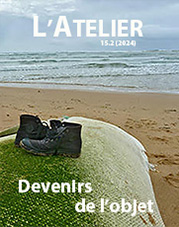« There were other things » : Exposer l’objet, décentrer l’humain, devenir chose dans la fiction empathique de Brian Evenson
Abstract
In the short story “Shirts and Skins” (2019), by contemporary American writer Brian Evenson, a couple goes at two key moments of the relationship to the minimalist exhibitions of the same artist: the shirts hung on pegs in the first case then become skins, each time accompanied by an unobtrusive white card designating the object. Ex-posing objects usually means subordinating them to humans as a superior category but here, positions are reversed: objects appear in full light, and humans find themselves decentered, so much so they are finally equally reunited in the fabric of the world, as things. The continuum linking the etymologically related textiles, skin tissues and texts tends to highlight the part played by language in the highly hierarchical relations that bind humans, but also humans and objects. Evenson’s prose, rejecting all forms of transcendence and authorial mediation, is intent on destabilizing those representations through a hybrid, porous and experiential work. The diegetic post-human grafts between humans and objects mirror the reader’s intensive experience, since the object known as text draws them into a symbiotic encounter. Flat ontologies make it possible to reconcile two seemingly distinct aspects of Evenson’s work: uncanny situations brought about unexpectedly by daily objects, and the environmental collapse related in post-apocalyptic stories. Nothing good can come without acknowledging the autonomous becoming of objects, and the becoming object of autonomous subjects.
Keywords: Brian Evenson, ecocriticism, flat ontologies, affect, representation, language, collapse, post-apocalyptic, decentering, anti-humanism
Downloads
Published
Issue
Section
License
- Work submitted for publication must be original, previously unpublished, and not under consideration for publication elsewhere. If previously published figures, tables, or parts of text are to be included, the copyright-holder's permission must have been obtained prior to submission.
- Authors of accepted manuscripts will assign to L'Atelier the right to electronically distribute their article, or publish it in any form (Internet, CD ROM, printed copy) but authors will retain copyright and, after the article has appeared in L'Atelier, authors may republish their text (in print and/or electronic form) as long as they clearly acknowledge L'Atelier as the original publisher.


